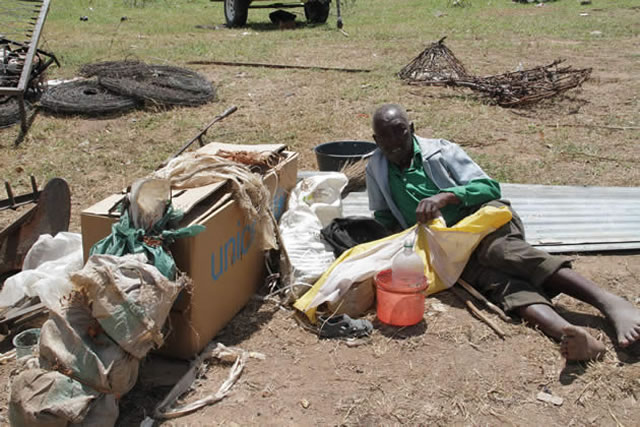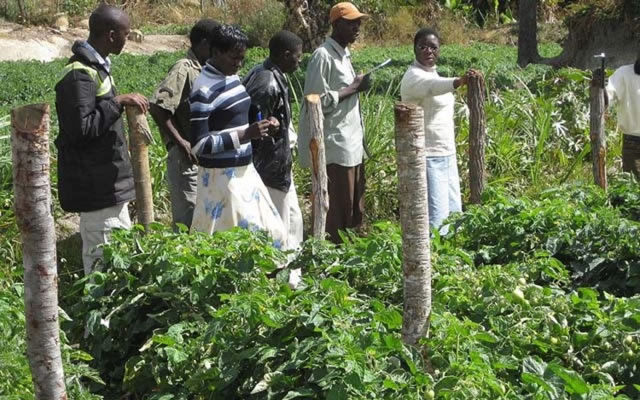Nightmare for Masvingo displaced villagers

 George Maponga
George Maponga
SITTING under the shade of a mopani tree in the sweltering heat at Chingwizi Holding Camp in the expansive Nuanetsi Ranch, Letwin Shonhai patiently attends to her barely month-old son, whom she says has never managed a peaceful sleep since the family’s relocation to the area a week ago.Shonhai, 22, has to contend with erecting a tent to serve as a temporary home for her three children.
The past few days have been hectic for her and many other families here.
Apart from attending to her new-born baby, she also had to search for scarce water and mopani tree poles to support the tent that will become home to her family.
Shonhai is not the only woman ensconced in the daily struggles of life at Chingwizi Holding Camp.
Hundreds of other women and young children constitute the largest population at the camp established for villagers being relocated from the Tokwe-Mukorsi Dam flood basin and downstream areas.
While the majority of women and children were loaded together with household property into lorries from the flood basin to Chingwizi, most men remained behind to tend to livestock, especially cattle.
Cattle remain a status symbol and a form of wealth, and when evacuation teams told marooned villagers that their first priority was to save human life, hundreds of men made the hard choice of remaining behind to look after their livestock.
They let their wives and children start a new life in uncharted lands.
Most relocated villagers were also forced to leave behind some of their children who are now staying with relatives far away from the dangers posed by the rising Tokwe-Mukorsi Dam flood waters.
They did this to allow them to continue with school since there are no schools yet at Chingwizi.
The relocated villagers do not only loathe the giant Tokwe-Mukorsi Dam for ravaging their livelihoods and forcing them to leave their ancestral homes, they also detest the involuntary separation from their loved ones.
Shonhai says it has been a while since she last saw her husband who remained in Village 20 of Nyajena communal lands.
“I came here with my three children, including my last born son who is a month old and my husband remained behind in Nyajena looking after our three cattle and donkeys,” she said.
“I am not sure when he will come to join the rest of us here. It is a nightmare for me to run around doing everything on my own because my children are still too young to help me. The situation might have been different had my husband been here.”
There is uncertainty over when they will be reunited.
“Life here is like living in a cage and to make matters worse, my husband and some of my children are not here with me,” said 54-year-old Martha Chipapatu who relocated from Chekai Village in Nemauzhe.
“I last saw my husband two weeks ago before I left home in Chivi. He was looking for some of our cattle and goats that strayed after the floods. He has found the livestock, but I am not sure how soon I will see him because he will only come together with our cattle and goats.”
The Tokwe-Mukorsi relocation co-ordinating committee says there are over 18,000 cattle and thousands more goats and donkeys in the area.
Families in Chingwizi want the relocation committee to speed up evacuation of their livestock so that they re-unite with their close relatives and rebuild their shattered lives.
While the majority of the 2,519 primary and secondary schoolchildren who were affected by the floods joined the great trek to Chingwizi, hundreds of others stayed behind in Chivi and Masvingo districts hoping to continue with their education.
Shandu Makumucho, who fled flooding in Jahwa Village, says she spent close to a week in Kushinga Transit Camp in Chivi while her son and daughter-in-law went on to Chingwizi.
A nephew took her to Masangula Camp in Nuanetsi Ranch.
“My son and his wife got into one of the lorries after loading their goods and just disappeared after dumping me at Kushinga Transit Camp,” said Makumucho.
“My daughter-in-law said she did not want the burden of looking after me anymore, especially in a new environment where people are not used to new challenges. They just left me here saying I should fend for myself and chart my own future.’’
Men, too, were not spared the pain and anguish of being separated from their loved ones.
Steven Mavusa, 36, who relocated from Mandishona Village in Gororo communal lands, said he would continue staying alone in Chingwizi until the humanitarian situation improves.
Mavusa said his wife and children were staying with his brother in Gutu as he fears their lives could be endangered by the situation at Chingwizi. “I am staying alone and I do not know for how long,” he said.
“I will continue like this, my wife and children could not come here with me because I feared for their health. This is a new home with new challenges and only when things normalise will I reunite with them here. There are no schools, and the camp is overcrowded. Water is a problem and people are at risk of malaria because this is a malaria-prone area. What good would I have done by bringing my wife and children with me?”
Simbarashe Ganduri, 32, from Chekai Village in Chivi says he will soon leave his wife in the holding camp to look for a job in South Africa. “My few belongings were swept away by floods. I have to start my life all over again and I cannot do that if I remain here.”
Shepherd Torerai said government should urgently build schools, clinics, roads, bridges and peg permanent plots in Chingwizi.
Chairperson of the Tokwe-Mukorsi relocation committee Felix Chikovo said government was making frantic efforts to move the over 18,000 cattle in the dam’s flood basin.
Chikovo says with improvement in the availability of lorries and trucks, it is only a matter of time before the villagers are joined by their cattle and livestock.
And families can be reunited.










Comments